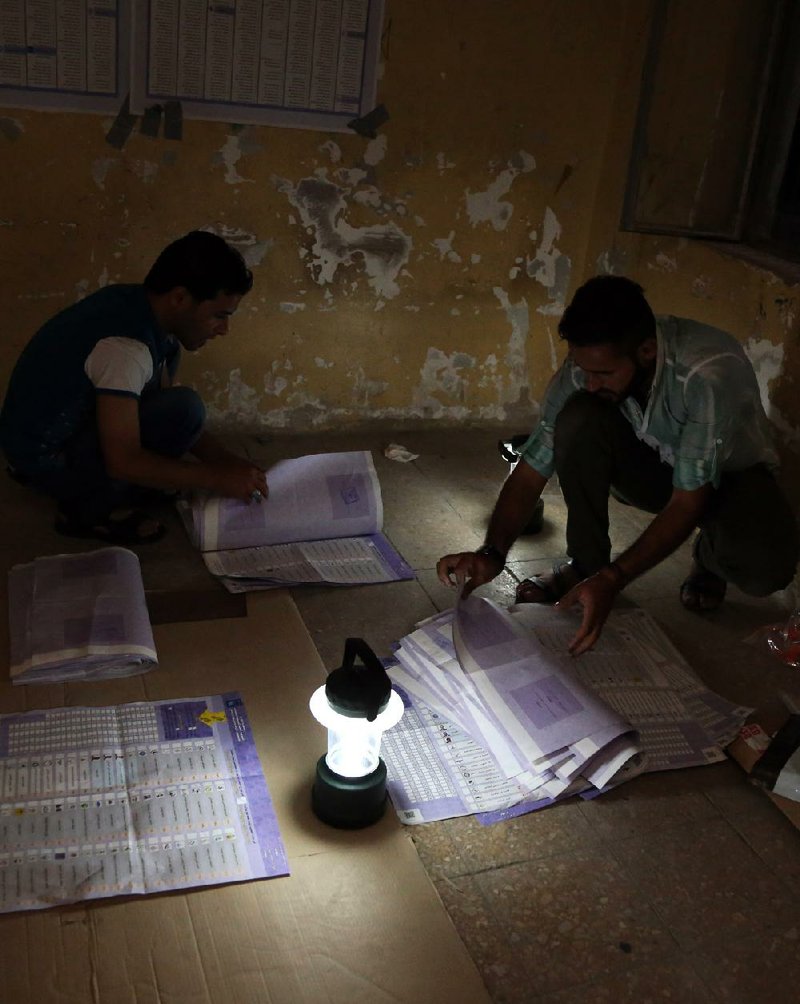BAGHDAD - Iraqis voted Wednesday in their first nationwide election since U.S. troops withdrew in 2011, with Prime Minister Nouri al-Maliki confident of victory and offering an olive branch to his critics by inviting them to join him in a governing coalition.
“Our victory is certain, but we are talking about how big is that certain success,” he said after voting in Baghdad.
“Here we are today, successfully holding the … election while no foreign troops exist on Iraqi soil. I call upon all the other groups to leave the past behind and start a new phase of good brotherly relations,” said al-Maliki, who faces growing criticism over government corruption and persistent bloodshed as sectarian tensions threaten to push Iraq back toward the brink of civil war.
Hundreds of thousands of troops and police deployed across the country Wednesday to protect polling centers and voters. In Baghdad, a city of 7 million, police and soldiers manned checkpoints roughly 500 yards apart, and pickups mounted with machine guns roamed streets that were otherwise deserted.
Scattered attacks took place north and west of Baghdad, killing at least five people and wounding 16. Roadside bombs killed two women and two election workers in the northern town of Dibis.
Voters’ sentiments ranged from despair to a gritty resolve to participate despite the threat of violence.
“I see this election as the last chance, my last bet on Iraq. If things continue to be the same, I will leave, and this time for good,” said Saad Sadiq Mustafa, 55, a retired army officer who fled with his family to neighboring Syria to escape the worst Sunni-Shiite violence of 2006 and 2007 and returned home in 2008.
A Sunni Arab and a father of four from Baghdad, Mustafa voted for Ayad Allawi, a secular Shiite who became Iraq’s first post-Saddam Hussein prime minister in 2004.
“We are living in a diverse country in which only seculars can maintain a balance between all ethnic and religious groups,” he said.
Al-Maliki’s State of Law bloc is expected to win the most seats in the 328-member parliament but fall short of a majority, analysts said. That would allow al-Maliki to keep his post only if he can cobble together a coalition - a task that took nine months after the last election in 2010.
Some of his onetime Shiite backers accuse him of trying to amass power for himself, but many in the majority sect have said they see no alternative to al-Maliki or are looking for a successor who would follow in his footsteps and guard Shiite political domination. Al-Maliki also has the support of neighboring Shiite powerhouse Iran.
Al-Maliki said he would have no objection to an alliance with any other bloc, provided it denounced sectarianism and worked for Iraq’s unity. But the Kurds already have said they will not be part of a coalition he leads.
“We have decided that joining an alliance with the prime minister is a red line for us,” parliament’s Sunni speaker, Osama al-Nujaifi, said as he voted. Last year, he called on al-Maliki to step down, accusing him of consolidating power in his hands.
Another thorny issue is who gets to be the next president. Elderly statesman Jalal Talabani, a Kurd, has served the maximum two terms. His departure is expected to revive calls by Iraqi Arabs, Shiite and Sunnis alike, for an Arab president. That would strain already-tense relations between Baghdad and the self-ruled Kurdish region in the north.
For the election, stores were closed and many had miles-long walks to the polls after authorities banned civilian vehicles to prevent car bombs. Voters were searched multiple times before being allowed inside polling centers, and surrounding streets were blocked by police trucks and barbed wire.
Turnout was estimated to be about 60 percent of Iraq’s 22 million eligible voters, said Muqdad al-Shuraifi, a senior election commission member. The figure, he explained, excluded “restive areas.”
Voters chose from more than 9,000 candidates.
Authorities did not offer a timetable for releasing results, but they are expected to start trickling in to election officials in the coming days. In 2010, results weren’t announced for about two weeks.
Al-Maliki rose from relative obscurity to office in 2006, when sectarian violence began to spiral out of control, with Sunni militants and Shiite militias butchering each other. The bloodshed ebbed by 2008 after U.S.-backed Sunni tribesmen rose up to fight al-Qaida-linked militants and Shiite militias declared a cease-fire.
But attacks have surged in the past year, fueled in part by al-Maliki’s moves last year to crush protests by Sunnis complaining of discrimination. Militants took over the city of Fallujah in Sunni-dominated Anbar province and parts of the provincial capital of Ramadi.
Last year, the death toll in Iraq climbed to its highest level since the worst of the sectarian strife in 2006 and 2007. The U.N. said 8,868 people were killed in 2013, and about 2,000 people were killed in the first three months of this year.
Information for this article was contributed by Sameer N.Yacoub and Qassim Abdul-Zahra of The Associated Press.
Front Section, Pages 6 on 05/01/2014


